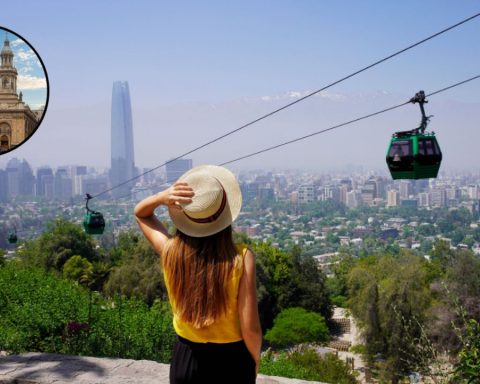During the formation of the Regional Council Against Organized Crime, the Undersecretary of the Interior, Manuel Monsalve, ruled out that the Government is going to present a new complaint for the State Security Law against the leader of the Arauco Malleco Coordinator (CAM), Héctor Llaitul , after the statements of the Mapuche leader in which he admitted that the organization “recovers” wood as a source of financing.
Monsalve commented that “as a government we have been summoned many times regarding the statements of Héctor Llaitul. We have said more than once that regarding the effectiveness of the application of the State Security Law, that the government is always summoned to sue for the State Security Law, its effectiveness has been nil, because today there is no one detained by the State Security Law”.
You may also like:
The head of the Undersecretary of the Interior assured that “if one wants to arrest, take to jail and prosecute those who commit crimes, what I would have to say is that this law has not allowed us to do that. But we were summoned, by the prosecutor national, to the Government to file a complaint for the statements of Héctor Llaitul and we concurred to expand the complaint because there were already complaints filed by the Law of State Security”.
Monsalve made reference to the Government’s announcement of the expansion of the State Security Law lawsuits against the leader of the CAM, after the Executive hardened its tone, summoning the Prosecutor’s Office to act.
“This extension of the complaint allows the national prosecutor and therefore the Public Ministry to investigate the constitution of crimes typified in the State Security Law, but it also allows him to prosecute possible common crimes, typified in the penal code, either with respect to the statements that Mr. Llaitul has already expressed, as with respect to those crimes that could be found in the investigation carried out by the Public Ministry,” added Undersecretary Monsalve.
“From my perspective, I think that what corresponds to the Public Ministry, more than to rule on what he said or did not say, what corresponds to the Public Ministry is to investigate to collect evidence that allows the classification of crimes. What the government seeks is that the Public Ministry collects the evidence, carries out the investigation processes, to gather the evidence and the tests that allow the classification of crimes and sanction them. That is the work that we expect from the Public Ministry, “emphasized the government authority.
Undersecretary Manuel Monsalve reiterated that the objective of these instances is to coordinate all State institutions that have the capacity and legal mandate to supervise, control or pursue criminal hotspots such as drug trafficking, possession of weapons, smuggling, among other crimes. associated with organized crime, propose action plans to confront them and diagnose the gaps in the institutions in order to have better results.
After meeting with the Governor of Valparaíso, Rodrigo Mundaca, and the regional prosecutor(s), Cristian Andrade, the Undersecretary of the Interior, Manuel Monsalve, together with the regional presidential delegate, Sofía González, led the constitution of the regional advisory council against organized crime .
On the occasion, Monsalve commented that “the task is to identify and dismantle the criminal organizations that bring in weapons, drugs, that are dedicated to reducing the vehicles that are stolen and that, therefore, are owners of a business, because as long as identify and dismantle relevant criminal organizations, it is very difficult for us to be able to change the trend in terms of crime and, particularly, violent crime”.
For her part, the Regional Presidential Delegate of Valparaíso, Sofía González, indicated that “the main objective is to articulate ourselves and define priorities among the different State organizations, to combat crime, seize weapons and ultimately respond to a basic need that is presented to us. neighbors throughout the Valparaíso region, about feeling safe when they walk the streets and look with great concern at how we have been losing certain spaces”.
This first session made it possible to define technical counterparts and establish a general diagnostic view of the Valparaíso region. “As our President has told us, we cannot continue to reproduce the same ways of confronting it. If we want results, we need concrete facts, set ourselves objectives and make ourselves available to what citizens require,” said the presidential delegate.
Regarding the latter, Undersecretary Monsalve added that another of the tasks of the regional council is to be able to “diagnose the gaps, therefore the shortcomings that an institution may have in order to be more effective in terms of organized crime.” In this sense, the authority advanced that for the Valparaíso region “the incorporation of new scanners for Customs is already being analyzed and in the case of the Gendarmerie, it will seek to strengthen the technological capacities to block the telephone signal inside the prisons ” .
The Regional Councils Against Organized Crime already established in the regions of Los Ríos, Araucanía, Biobío, Metropolitana, Antofagasta, Tarapacá, Arica and now in Valparaíso are made up of Carabineros, PDI, the National Customs Service, Gendarmerie, the General Directorate of National Mobilization (DGMN), the General Directorate of Civil Aeronautics (DGAC) and the General Directorate of the Maritime Territory and Merchant Marine (DIRECTEMAR) and will have the participation of strategic partners such as the Public Ministry, Governor, regional, Service of Internal Taxes (SII), CONAF, Agricultural and Livestock Service (SAG) and Civil Registry and identification.
















